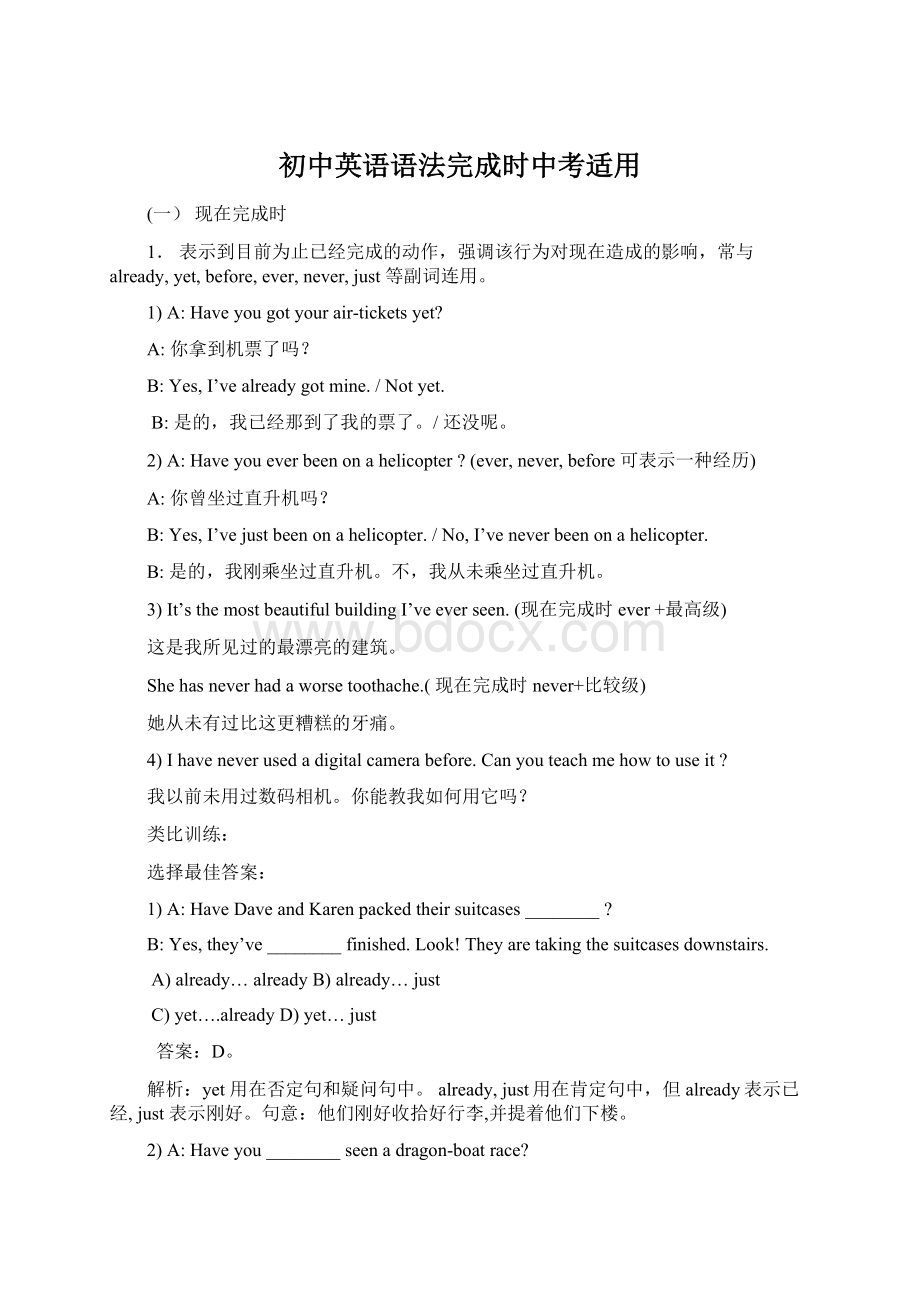 初中英语语法完成时中考适用.docx
初中英语语法完成时中考适用.docx
- 文档编号:5843447
- 上传时间:2023-01-01
- 格式:DOCX
- 页数:11
- 大小:21.77KB
初中英语语法完成时中考适用.docx
《初中英语语法完成时中考适用.docx》由会员分享,可在线阅读,更多相关《初中英语语法完成时中考适用.docx(11页珍藏版)》请在冰豆网上搜索。

初中英语语法完成时中考适用
(一)现在完成时
1.表示到目前为止已经完成的动作,强调该行为对现在造成的影响,常与already,yet,before,ever,never,just等副词连用。
1)A:
Haveyougotyourair-ticketsyet?
A:
你拿到机票了吗?
B:
Yes,I’vealreadygotmine./Notyet.
B:
是的,我已经那到了我的票了。
/还没呢。
2)A:
Haveyoueverbeenonahelicopter?
(ever,never,before可表示一种经历)
A:
你曾坐过直升机吗?
B:
Yes,I’vejustbeenonahelicopter./No,I’veneverbeenonahelicopter.
B:
是的,我刚乘坐过直升机。
不,我从未乘坐过直升机。
3)It’sthemostbeautifulbuildingI’veeverseen.(现在完成时ever+最高级)
这是我所见过的最漂亮的建筑。
Shehasneverhadaworsetoothache.(现在完成时never+比较级)
她从未有过比这更糟糕的牙痛。
4)Ihaveneverusedadigitalcamerabefore.Canyouteachmehowtouseit?
我以前未用过数码相机。
你能教我如何用它吗?
类比训练:
选择最佳答案:
1)A:
HaveDaveandKarenpackedtheirsuitcases________?
B:
Yes,they’ve________finished.Look!
Theyaretakingthesuitcasesdownstairs.
A)already…alreadyB)already…just
C)yet….alreadyD)yet…just
答案:
D。
解析:
yet用在否定句和疑问句中。
already,just用在肯定句中,但already表示已经,just表示刚好。
句意:
他们刚好收拾好行李,并提着他们下楼。
2)A:
Haveyou________seenadragon-boatrace?
B:
No,I’ve_______seenadragonboatrace.IhopeIwillgotoseeitwhileI’minChina.
A)ever…everB)ever…neverC)never…neverD)never…ever
答案:
B。
解析:
ever用在疑问句中。
never表否定。
3)A:
_______youryoungerbrother_______aforeignlanguagebefore?
B:
Yes,hehas.He________Germanlastyear.
A)Havestudied…studiedB)Hasstudied…studied
C)Didstudy…hasstudiedD)Didstudy…havestudied
答案:
B。
解析:
现在完成时与before时间状语连用。
lastyear表明该句应用过去时。
4)I’ve_________seena__________concert.
A)never…morewonderfulB)never…themostwonderful
C)ever…morewonderfulD)ever…themostwonderful
答案:
A。
解析:
现在完成时never+比较级。
句意:
她从未看过比这更精彩的音乐会。
表示持续到现在的动作或状态,常与since,for,howlong等表示一段时间的状语连用。
a)A:
HowlonghaveyoulearnedEnglish?
A:
到目前为止你学英语有多久了?
B:
SinceIwasinGradeOne/Since1997/Since8yearsago/For8years.
B:
自从我上一年级以来。
/自从1997年以来。
/自从8年前以来。
/到目前已有8年了。
(since后接句子,或时间点;for后接时间段。
)
b)A:
Howlonghaveyoubeenlikethis?
A:
你像这样有多久了?
B:
Sincethismorning.
B:
自从今天早上以来。
类比训练:
用sinceforhowlong填空:
1)A:
__________haveyouwaitedhere?
B:
________halfpasteight.
答案:
Howlong(多久),Since(接时间点)。
2)A:
________whenhaveyoulivedinLosAngeles?
B:
_________weemigrated(移居)fromChina.
答案:
Since(接时间点,sincewhen相当于howlong),Since后接句子。
3)Theyhaveownedthatbusiness__________eightmonths.
答案:
for(后接时间段)。
4)Ihaven’tfeltverywell________aweekago.
答案:
since(接时间点)。
(二)现在完成时和一般过去时区别
1.A:
Haveyouhadyourlunchyet?
B:
Yes,Ihave.
现在完成时强调该行为对现在造成的结果和影响。
上述答句隐含着“不饿”的意思。
A:
Whendidyouhaveit?
B:
Atabouttwelve.
A:
Wheredidyouhaveit?
B:
Atschool.
一般过去时强调过去的事实,如:
时间、地点、原因或方式。
2.Hehaslivedabroadformanyyears.
他在国外生活了很多年。
(他现在在国外)
现在完成时强调该行为或状态持续至今。
Helivedabroadformanyyears.
他在国外生活了很多年。
(他已不在国外)
一般过去时强调过去的行为或状态不涉及现在。
类比训练:
用所给动词的适当形式填空:
1)A:
Who___________(take)awaymyumbrella?
Ican’tfinditnow.
B:
Oh,Sally__________(take)itawayjustnow.
答案:
hastaken。
强调对现在造成结果和影响:
我找不到伞了。
took。
justnow刚才,用于过去时,不同于just。
2)I___________(learn)alotfromthefarmers.IstillrememberthedayswhenIwaswiththem.
I___________(learn)alotfromthefarmerswhileIwasonthefarm.
答案:
havelearned。
强调对现在造成结果和影响:
我仍记得那些与农民在一起的日子。
learned。
强调当时在农场时,我学到了许多。
3)Myuncle___________(live)inVancouverfortwentyyears.NowhelivesinShanghaiandhasabusinessofhisown.
答案:
lived。
根据句意他已不在温哥华生活。
4)Myuncle_________(live)inVancouverfortwentyyears.Heoftencallsbacktosayhellotous.
答案:
haslived。
根据句意他还在温哥华生活。
(三)现在完成时在上下文中的使用
1)完成时与现在时
A:
Youlookverytired.
A:
你看上去很累。
B:
Yes,I’vewalkedmanymilestodaybecauseI’mtoldthatwalkingisthebestexercise.
B:
是的,我今天走了好几里地因为我听说走路是最好的锻炼。
2)完成时和过去时
A:
Haveyouboughtsteakyet?
A:
你买牛肉了吗?
B:
Yes,I’vealreadydoneso.
B:
早买好了。
A:
Wheredidyoubuyit?
A:
你在哪儿买的?
B:
Inthesupermarket.Thesteakthereisalwaysfresh.
B:
在超市买的那里的牛肉很新鲜。
3)完成时和现在进行时
A:
Haveyoufinishedwritingyourreportyet?
A:
你写完报告了吗?
B:
Not,yet.It’sreallyhardwork,soI’mstillworkingonit.
B:
还没呢。
这是一项艰巨的任务。
我还在写呢。
4)完成时和将来时
A:
HaveyoubeentotheEgyptianMummyExhibitioninZhongShanPark?
A:
你去过中山公园的木乃伊展吗?
B:
No,Ihaven’t.
B:
没去过。
A:
NeitherhaveI.I’llvisititthisweekend.Wouldyouliketogowithme?
A:
我也没去过。
这周末我将去参观。
你愿意和我一块去吗?
B:
Ofcourse.Thatmustbefun.
B:
当然。
那一定很有趣。
类比训练:
1)A:
________you_________(check)yourpassportyet?
B:
No,I_________(check)itlater.
答案:
havechecked,willcheck。
2)A:
______Yourmother_________(call)thetravelagencyyet?
B:
yes,she________(alreadydo)so.
A:
Why_______she_________(call)thetravelagency?
B:
Becauseshe________(want)togetmoreinformationabouttravelingtoFrance.
答案:
Haschecked,hasalreadydone,wanted。
3)A:
What_______you_______(do)now?
B:
I________(play)videogames.
A:
You________(play)videogamessincethismorning.Stopit!
When______you_______(go)overyourlessons?
B:
Sorry,mum.I________(do)myhomeworkatonce.
答案:
aredoing,areplaying,haveplayed,willgo,willdo。
4)A:
You________(look)upset.What’sthematter?
B:
I________(lose)mywallet.Icantfindit.]
A:
Don’tworry.Letmehelpyoulookforit.
答案:
look,havelost。
(四)动词意义对现在完成时的影响
1.历时短暂的动词不与表示一段时间的状语连用,一般用相应的持续动词替代。
1)HehasbeenintheVolleyballClubsinceonemonthago.(代替join)
一个月前以来他已加入了排球队。
2)Shehasstayedhereforthreehours.(代替come)
她在这儿已呆了三个小时。
3)短暂动词与相应的持续动词
join(theYoungPioneer/bein(theYoungPioneer/theYouthLeague
theYouthLeague/theParty)theYouthLeague/theParty)
beaYoungPioneer/Leaguemember/Partymember
come(here/back)be(here/back)
go(there/toChina)be(there/inChina)
leave(Shanghai)beawayfrom(Shanghai)
fall(asleep/ill)be(asleep/ill)
diebedead
beginbeon
finish/endbeover
borrowkeep
buyhave/own
类比训练:
改写下列句子:
1)Thefilmbeganhalfanhourago.
Thefilm_____________________________halfanhour.
答案:
hasbeenon,for。
2)Themanagerarrivedhereafewminutesago.
Themanager____________________here________afewminutesago.
答案:
hasbeen,since。
3)IbegantolearnEnglishwhenIwasinGradeOne.
I_______________English_______IwasinGradeOne.
答案:
havelearned,since。
4)LiPingcaughtacoldthedaybeforeyesterday.
LiPing________________acoldsincethedaybeforeyesterday.
答案:
hashad。
5)Myclassmatebecameanastronautwhenheleftschool.
Myclassmate__________________anastronautsinceheleftschool.
答案:
hasbeen。
6)ComradeLeiFengdiedin1963.
He________________________for42years
答案:
hasbeendead。
.
7)Themeetingendedafewminutesago.
It_______________________forafewminutes.
答案:
hasbeenover。
2.短暂动词的否定形式可与since,for连用
1)Hehasn’tcomebacksinceheleftChina.
自从他离开中国以来,他从未回来过。
2)Theyhaven’tborrowedbooksfortwomonths.
他们已有两个月未借书了。
类比训练:
中译英
1)我们几年没见面了。
答案:
Wehaven’tmeteachotherforseveralyears.
2)开学以来我们没去过公园。
答案:
Wehaven’tgonetotheparksinceschoolbegan.
(五)havegoneto,havebeento和havebeenin
1.MyfatherhasgonetoBeijing.(“去了”。
Heisn’there.)
2.MyfatherhasbeentoBeijingmanytimes.(“去过”。
He’shere.)
3.MyfatherhasbeeninBeijingforquiteafewdays.(“在北京好几天”。
表示持续的状态)
4.Hehasbeentheretwice.(=Hehasbeentoaplacetwice.)
Hehasbeenherefortwodays.(=Hehasbeeninaplacefortwodays.)
类比训练:
用havegoneto,havebeento和havebeenin填空:
1BarbaraandTracy___________Tokyoforaholiday.NowtheyarebackinChina.They__________theretwice.
答案:
havebeento,havebeen。
句意:
巴巴拉和翠希去过东京度假。
现在他们已回到中国。
她们到那儿去过两次。
2Mr.He________thedentist’s.Unfortunately,hewon’tbebackuntil12o’clockbecausetherearetoomanypatientsthere.He________thedentist’sfortwohours.Nexttimehe’dbettermakeanappointmentinadvance.
答案:
hasgoneto,hasbeenin。
何先生到牙医那儿去了。
不幸是他要到中午12点才能回来。
他已经在牙医诊所呆了两小时。
下一次,他最好是事先约好。
(六)过去完成时的用法
1.表示过去之前发生的动作(即过去的过去)
1)Bynoon,wehadwalkedabouttwentymiles.
到中午时,我们已走了20英里。
(由by引起的时间状语)
2)BythetimeMikeleft,Williamhadspoketohim.
到迈克离开为止,威廉姆斯已跟他谈过话。
(由by引起的时间状语从句)
3)Ithadreturnedinthedarknesswhenthecitizenscelebratedinside.
当特洛伊市民在城内热烈庆贺时,军队早已在黑暗中返回。
(由when引起的时间状语从句,先发生动作用用过去完成时,迟发生的动作用一般过去时)
4)BeforehelefttheUnitedStates,heacted/hadactedinseveralTVprogramme.
在他离开美国之前,他参与多部电视节目的表演。
5)AfterShehadmoved/movedtoHongKong,shebecameverypopular.
在她搬至香港之后,她变得受欢迎。
(有before,after时间状语从句,先发生的动作用过去完成时,迟发生的动作用一般过去时。
也可都用一般过去时,因为before,after已表明动作的先后。
)
6)Theteacheraskedstudentsiftheyhadfinishedreadingthenovel.
那位教师问学生他们是否读完那本小说。
(在宾语从句中过去完成时表明从句中的动作hadfinished先于主句中的动作asked)
2.表示持续到过去某一时间的动作或状态
1)Uptillthentheyhadwaitedatthebusstopforabouthalfanhour.
到那时为止,他们已在车站等了半小时。
2)Shetoldmethattheyhadbeenfriendssincetheymetatschool.
她告诉我自从她们在学校认识以来,他们一直是好朋友。
类比训练:
用所给动词的适当形式填空:
1.Idroppedmycreditcard.I__________(justuse)itintheshop
答案hadjustused。
.
2.Whenwegottothebankatteno’clock,themanagertoldusthemen________(alreadyrob)thebank.
答案:
hadalreadyrobbed。
3.Beforeshesatdowntoeat,she_________(cook)dinner.
答案:
hadcooked/cooked。
4.She_________(stay)inRomeforafewmonths,sosheknewhowtocookItalianfood.
答案:
hadstayed。
5.Iwonderedwhatshe_____________(do)recentlyinAmerica.
答案:
haddone。
6.We________(arrive)bythetimeitstartedraining.
答案:
hadarrived。
(七)过去完成时和现在完成时的区别
1.Hehasbrokentwoworldrecordssincelastyear.
从去年到现在,他打破了两项世界记录。
(从去年到现在,用现在完成时)
2.Hehadbrokentwoworldre
- 配套讲稿:
如PPT文件的首页显示word图标,表示该PPT已包含配套word讲稿。双击word图标可打开word文档。
- 特殊限制:
部分文档作品中含有的国旗、国徽等图片,仅作为作品整体效果示例展示,禁止商用。设计者仅对作品中独创性部分享有著作权。
- 关 键 词:
- 初中英语 语法 完成 中考 适用
 冰豆网所有资源均是用户自行上传分享,仅供网友学习交流,未经上传用户书面授权,请勿作他用。
冰豆网所有资源均是用户自行上传分享,仅供网友学习交流,未经上传用户书面授权,请勿作他用。


 铝散热器项目年度预算报告.docx
铝散热器项目年度预算报告.docx
